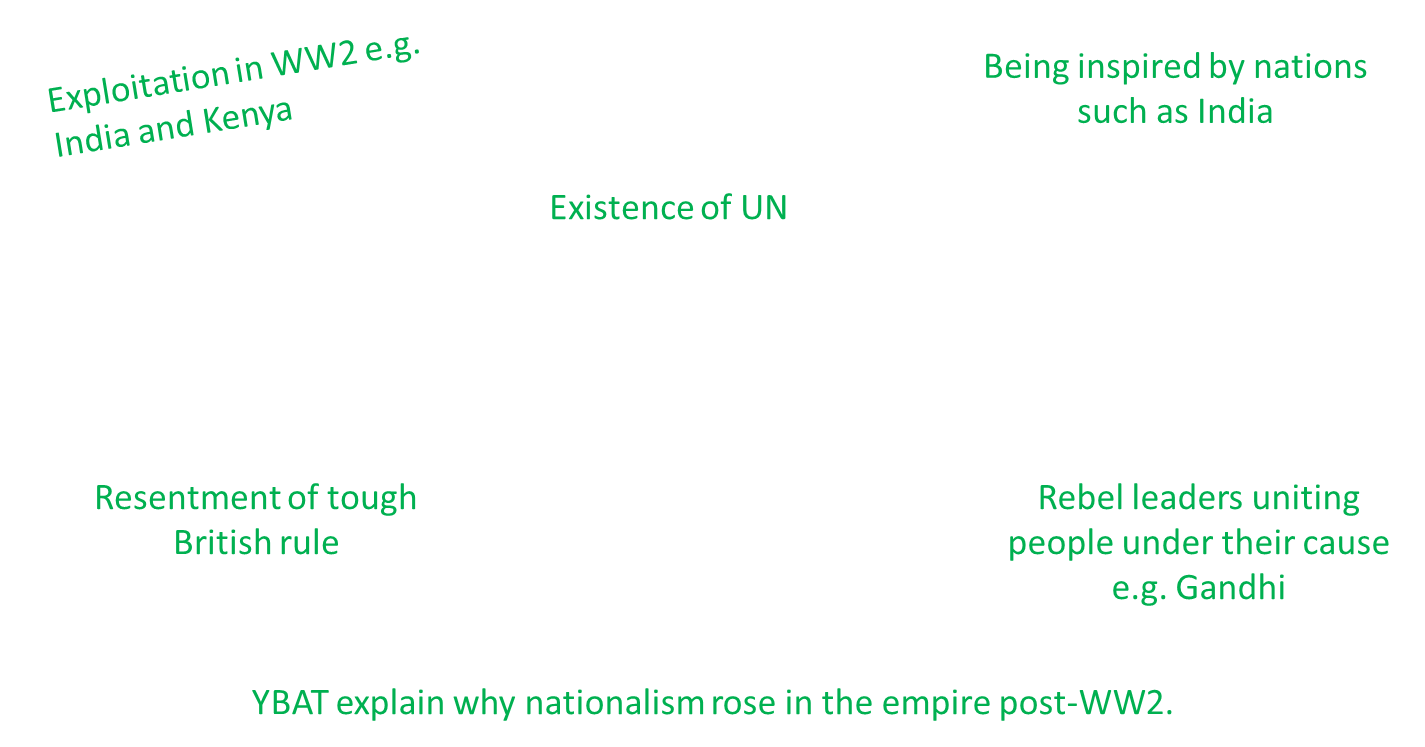Why did countries in the Empire want independence in the 1950s?
1/12
There's no tags or description
Looks like no tags are added yet.
Name | Mastery | Learn | Test | Matching | Spaced |
|---|
No study sessions yet.
13 Terms
colony
a territory that is controlled and governed by a foreign power, often established for economic exploitation and strategic advantage.
typically lacked self-governance and were subject to the political and economic systems of the colonizing country.
nationalism
A political ideology that promotes the interests of a particular nation, often leading to the desire for independence from colonial rule.
colonial nationalism
A form of nationalism that arises in colonized countries, emphasizing self-determination and independence from colonial powers.
crown dominions
countries in the commonwealth that recognise the Queen e.g. Australia
republican dominions
countries in the Commonwealth that do not recognise the Queen e.g. India and Pakistan
what impact did WW2 have on imperial policy
Singapore, Hong Kong and Malaya were occupied by the Japanese in 1942 – Britain was worried about her Empire depleting.
We know there is evidence of exploitation of colonies for resources and production to help with the war e.g. Bengali famine. Farmers in Kenya were forced to sell crops at a fixed, low price.
UN was formed who was officially opposed to colonialism – pressure from the 2 world superpowers to decolonise.
Mediterranean strategy during the war nearly cost the alliance!
Commonwealth developed by post-war governments. The idea was that after decolonisation, countries would join the Commonwealth and continue to trade with Britain
reasons for colonial nationalist rising already

case study: India
We are already aware of Churchill’s outspoken views on India in the 1930s.
The Government of India Act 1935 had promised self government for India. Any foreign/defence policy was still controlled by a British administrator.
India was vulnerable to Japanese attack by 1942. Britain declared war on Germany on India’s behalf – the Indian government was angry that they had not been consulted on this decision.
The British government promised India post-war independence and self-governance. India became heavily reliant on American loans.
British views were that India was too much hassle by 1947 and that parts of Africa were more flexible and adaptable.
Lord Mountbatten visited in 1947 to confirm the independence of India and Pakistan as two states. Britain no longer could control foreign/defence policy in India
why does colonial nationalism rise
Reason | Summarise | Make a judgment – how important was this |
|---|---|---|
Impact of WW2 | WW2 exposed Britain's vulnerability. Japanese occupation of British colonies in Asia showed they could be defeated. Britain’s allies (USA & USSR) were anti-imperialist, and the creation of the UN in 1945 further pressured Britain to decolonise. Exploitation during the war (e.g. Bengal famine, fixed crop prices in Kenya) fuelled resentment. India used Britain’s weakened post-war position to push for independence. | Very important – Undermined British power both militarily and morally. Encouraged nationalist leaders, created resentment, and shifted international norms. |
Economic weakness | Britain faced £2 billion a year in debt after the war. Reliant on US loans and Marshall Aid. Post-war Labour reforms (e.g. NHS) made empire maintenance too expensive. The Colonial Development Corporation (CDC) aimed to improve conditions but often created resentment due to corporate profits and impact on local livelihoods. Economic needs pushed Britain to seek cheaper ways of managing empire. | Important – Britain couldn’t afford to maintain control. Although development was attempted, economic strain led to retreat and fueled dissatisfaction. |
Impact of Cold War | US initially wanted Britain to maintain order in colonies to prevent Soviet influence. However, global pressure — especially from the UN and other white European countries — criticised Britain’s imperialism. Britain struggled with increasing unrest (e.g. Egypt). The Cold War made anti-colonialism more prominent, especially as Britain failed to effectively manage nationalist resistance. | Moderately important – Cold War geopolitics influenced Britain’s decisions, but economic decline and post-war shifts were more decisive for nationalism’s rise. |
if the UN didn’t exist, would Britain still have parts of her Empire intact?
Without the UN's influence, Britain might have retained some territories longer due to reduced international pressure for decolonization.
causes of India problem
Britain weakened by WW2 |
Rise of Indian nationalism |
Religious tensions between Hindus & Muslims |
Changing British politics |
Global pressure & UN influence |
events of India problem
Economic and military exhaustion made it harder to suppress demands for independence |
Quit India Movement (1942) led by Gandhi and Nehru rejected cooperation with Britain |
Muslim League demanded a separate state (Pakistan); growing communal violence |
Attlee’s Labour government elected in 1945; appointed Mountbatten to manage independence |
Britain came under criticism for its imperialism; US and UN favoured self-determination |
consequences of India problem
Britain recognised it couldn’t maintain empire — opened door for negotiations with Indian leaders |
British authority was undermined; mass arrests backfired and increased Indian unity against colonial rule |
Britain feared civil war and saw Partition as the only way to avoid prolonged conflict |
Political will shifted to decolonisation; rapid plans made for British withdrawal |
Diplomatic pressure contributed to Britain’s decision to decolonise sooner rather than risk international backlash |